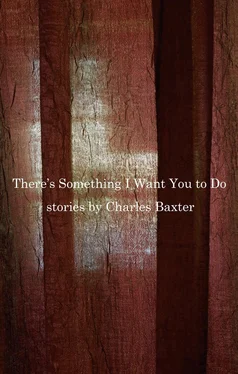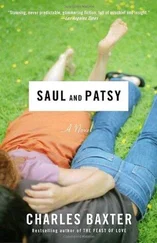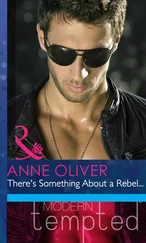Charles Baxter
There's Something I Want You to Do
For Daniel and Hannah Baxter and for Arturo Steely
It is common knowledge that nobody is born with a decalogue already formed, but that everyone builds his own either during his life or at the end, on the basis of his own experiences, or of those of others which can be assimilated to his own; so that everybody’s moral universe, suitably interpreted, comes to be identified with the sum of his former experiences, and so represents an abridged form of his biography.
— Primo Levi, The Reawakening
When she was a teenager, her junior year, her favorite trick involved riding in cars with at least two other girls. You needed a female cluster in there, and you needed to have the plainest one driving. They’d cruise University Avenue in Palo Alto until they spotted some boys together near a street corner. Boys were always ganged up at high-visibility intersections, marking territory and giving off cigarette smoke and musk. At the red light, she’d roll down the window and shout, “Hey, you guys!” The boys would turn toward the car slowly— very slowly — trying for cool. Smoke emerged from their faces, from the nose or mouth. “Hey! Do you think we’re pretty?” she’d shout. “Do you think we’re cute?”
Except for the plain one behind the wheel, the girls she consorted with were cute, so the question wasn’t really a test. The light would turn green, and they’d speed away before the boys could answer. The pleasure was in seeing them flummoxed. Usually one of the guys, probably the sweetest, or the most eager, would nod and raise his hand to wave. Susan would spy him, the sweet one, through the back window, and she’d smile so that he’d have that smile to hold on to all night. The not-so-sweet good-looking guys just stood there. They were accustomed to being teased, and they always liked it. As for the other boys — well, no one ever cared about them.
Despite what other girls said, boys were not all alike: you had to make your way through their variables blindly, guessing at hidden qualities, the ones you could live with.
Years later, in college, her roommate said to her, “You always go for the kind ones, the considerate ones, those types. I mean, where’s the fun? I hate those guys. They’re so humane, and shit like that. Give me a troublemaker any day.”
“Yeah, but a troublemaker will give you trouble.” She was painting her toenails, even though the guys she dated never noticed her toenails. “Trouble comes home. It moves in. It’s contagious.”
“I can take it. I’m an old-fashioned girl,” her roommate said with her complicated irony.
—
Susan married one of the sweet ones, the kind of man who waved at you. At a San Francisco art gallery on Van Ness, gazing at a painting of a giant pointed index finger with icicles hanging from it, she had felt her concentration jarred when a guy standing next to her said, “Do you smell something?”
He sniffed and glanced up at the ceiling. Metaphor, irony, a come-on? As a pickup line, that one was new to her. In fact, she had smelled a slightly rotten-egg scent, so she nodded. “We should get out of here,” he said, gesturing toward the door, past the table with the wineglasses and the sign-in book. “It’s a gas leak. Before the explosion.”
“But maybe it’s the paintings,” she said.
“The paintings? Giving off explosive gas? That’s an odd theory.”
“Could be. Part of the modernist assault on the audience?”
He shrugged. “Well, it’s rotten eggs or natural gas, one of the two. I don’t like the odds. Let’s leave.”
On the way out, he introduced himself as Elijah, and she laughed and spilled some white wine (she had forgotten she was holding a glass of it) onto her dress just above the hemline. He handed her a monogrammed handkerchief that he had pulled out of some pocket or other, and the first letter on it was E, so he probably was an Elijah after all. A monogrammed handkerchief! Maybe he had money. “Here,” he said. “Go ahead. Sop it up.” He hadn’t tried to press his advantage by touching the handkerchief against the dress; he just handed it over, and she pretended to use it to soak up the wine. With the pedestrians passing by and an overhead neon sign audibly humming, he gave off a blue-eyed air of benevolence, but he also looked on guard, hypervigilant, as if he were an ex-Marine. God knows where he had found the benevolence, or where any man ever found it.
“Elijah.” She looked at him. In the distance a car honked. The evening sky contained suggestions of rain. His smile persisted: a sturdy street-corner boy turned into a handsome pensive man but very solid-seeming, one thumb inside a belt loop, with a streetlamp behind him giving him an incandescent aura. Physically, he had the frame of a gym rat. She had the odd thought that his skin might taste of sugar, his smile was so kind. Kindness had always attracted her. It made her weak in the knees. “Elijah the prophet? Who answers all questions at the end of time? That one? Your parents must have been religious or something.”
“Yeah,” he said noncommitt  ally, bored by the topic. “ ‘Or something’ was exactly what they were. They liked to loiter around in the Old Testament. They trusted it. They were farmers, and they believed in catastrophes. But when you have to explain your own name, you…well, this isn’t a rewarding conversation, is it?” He had a particularly deliberate way of speaking that made him sound as if he had thought up his sentences several minutes ago and was only now getting around to saying them.
ally, bored by the topic. “ ‘Or something’ was exactly what they were. They liked to loiter around in the Old Testament. They trusted it. They were farmers, and they believed in catastrophes. But when you have to explain your own name, you…well, this isn’t a rewarding conversation, is it?” He had a particularly deliberate way of speaking that made him sound as if he had thought up his sentences several minutes ago and was only now getting around to saying them.
She coughed. “So what do you do, Elijah?”
“Oh, that comes later,” he said. “Occupations come later. First tell me your name.”
“Susan,” she said. “So much for the introducti  ons.” She leaned forward, showing off her great smile. “This wine. It’s so bad. I’m kind of glad I spilled it. Shall I spill more of it?” She hadn’t had more than a sip, but she felt seriously drunk.
ons.” She leaned forward, showing off her great smile. “This wine. It’s so bad. I’m kind of glad I spilled it. Shall I spill more of it?” She hadn’t had more than a sip, but she felt seriously drunk.
“Well, you could spill it here.” He reversed his index finger and lifted up his necktie. “Or there.” He pointed at the sidewalk.
“But it’s white wine. White wine doesn’t really stain.” She threw the wineglass into the gutter, where it shattered.
Twenty minutes later, in a coffee shop down by the Embarcadero, she learned that he was a pediatric resident with a particular interest in mitochondrial disorders. Now she understood: out on the street, he had looked at her the way a doctor looks at a child. She herself was a psychiatric social worker, with a job waiting for her at an outpatient clinic in Millbrae. She and Elijah exchanged phone numbers. That night, rattled by their encounter, she couldn’t sleep. Three days later, still rattled, she called him and proposed a date, something her mother had advised her never to do with a man. They went to dinner and a movie, and Elijah fell asleep during the previews and didn’t wake up for another hour — poor guy, he was so worn out from his work. She didn’t bother to explain the plot: a villain had threatened the end of the world — the usual. Elijah was too tired to care.
He didn’t warm up to her convincing  ly — not as she really hoped he would — for a month, until he heard her sing in a local choir, a program that included the Vaughan Williams Mass in G Minor. She had a solo in the opening measures of the Benedictus, and when Elijah found her at the reception afterward, his face, as he looked at her, was softened for the first time with actual love, the real thing, that yearning, both hungry and quizzical.
ly — not as she really hoped he would — for a month, until he heard her sing in a local choir, a program that included the Vaughan Williams Mass in G Minor. She had a solo in the opening measures of the Benedictus, and when Elijah found her at the reception afterward, his face, as he looked at her, was softened for the first time with actual love, the real thing, that yearning, both hungry and quizzical.
Читать дальше

 ally, bored by the topic. “ ‘Or something’ was exactly what they were. They liked to loiter around in the Old Testament. They trusted it. They were farmers, and they believed in catastrophes. But when you have to explain your own name, you…well, this isn’t a rewarding conversation, is it?” He had a particularly deliberate way of speaking that made him sound as if he had thought up his sentences several minutes ago and was only now getting around to saying them.
ally, bored by the topic. “ ‘Or something’ was exactly what they were. They liked to loiter around in the Old Testament. They trusted it. They were farmers, and they believed in catastrophes. But when you have to explain your own name, you…well, this isn’t a rewarding conversation, is it?” He had a particularly deliberate way of speaking that made him sound as if he had thought up his sentences several minutes ago and was only now getting around to saying them.










